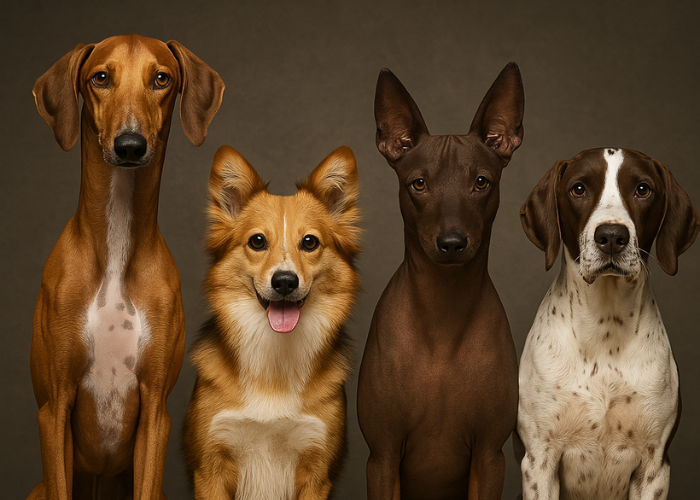Dogs are fascinating animals, full of skills and behaviors that surprise us. Among the many mysteries surrounding our four-legged friends, one of them is how they react to their own reflection in the mirror.
Can dogs recognize themselves in their reflections? Or do they just see another dog? In this article, we’ll explore how dogs perceive mirrors, what science says about it, and how this behavior reflects their intelligence and instincts.
The Mirror and Self-Recognition: A Cognitive Challenge
Recognizing one’s own reflection in a mirror is considered a test of self-awareness in animals. This test, known as the “Mirror Test,” was developed in the 1970s by psychologist Gordon Gallup. The idea is simple: an animal is shown a mirror and then given a mark on a part of its body that can only be seen with the aid of the reflection. If the animal touches or tries to remove the mark, it indicates that it has recognized itself in the mirror.
Species such as dolphins, elephants, and great apes, including humans, have all passed the test by demonstrating self-awareness. However, most dogs do not exhibit this behavior. Does this mean that dogs lack self-awareness? Not necessarily.
How Do Dogs React to the Mirror?
Dogs’ reactions to mirrors vary greatly. Many dogs, when faced with their reflection for the first time, may:
- Barking or growling, as if they were facing another dog.
- Show curiosity, trying to interact with the “other dog”.
- Completely ignoring the mirror, after realizing that the reflection has no smell or independent behavior.
These reactions show that, for dogs, the mirror is not something that is naturally relevant. They rely more on other senses, such as smell and hearing, to interpret the world around them.
Canine Perception and the Role of Smell
Dogs have an extremely powerful sense of smell, about 10,000 to 100,000 times more sensitive than humans. For them, smell is the main way to identify other beings and the environment. Therefore, when they see a reflection in the mirror, they cannot associate it with another dog, since the reflection does not emit any smell.
Additionally, smell also plays a major role in how dogs recognize themselves. Studies suggest that dogs may have a distinct type of self-awareness based on smell. In one experiment, dogs were presented with samples of their own urine and that of other dogs. They showed more interest in the urine of others, indicating that they recognize their own scent.
The Mirror and Canine Intelligence
Dogs’ inability to recognize themselves in the mirror does not mean they are any less intelligent. Dog intelligence is simply different from that of humans and other species. While the “Mirror Test” measures a specific type of visual self-awareness, dogs demonstrate intelligence in areas such as:
- Reading human emotions: Dogs are experts at interpreting facial expressions and tone of voice.
- Problem solving: They learn commands, solve puzzles and adapt to different situations.
- Olfactory memory: Dogs can remember smells for long periods of time, which is essential for their survival and social interaction.
What Does Science Say?
Scientific research suggests that dogs may not recognize themselves visually, but they do have a type of olfactory self-awareness. A study conducted by ethologist Roberto Cazzolla Gatti, published in 2015, proposed a “Smell Test” as an alternative to the “Mirror Test.” In this experiment, dogs were exposed to the smell of their own urine and that of other dogs. They showed greater interest in the odors of others, suggesting that they recognize their own smell and can differentiate it.
This study raises the hypothesis that canine self-awareness is more related to smell than vision. This makes sense, considering that smell is the most developed sense in dogs.
The Mirror as a Tool for Enrichment The Mirror as a Tool for Enrichment
Although dogs do not recognize themselves in mirrors, they can be used as an environmental enrichment tool. Initial curiosity about the reflection can stimulate exploration and mental exercise. However, it is important to monitor your dog’s reaction to ensure that he does not become stressed or confused.
Curiosities About Canine Behavior in the Mirror
- Puppies generally react more to mirrors: Puppies are more curious and may play with their reflection as if it were another dog.
- Familiarity reduces interest: After a few interactions, most dogs lose interest in the mirror, realizing that it has no real scent or response.
- Dogs with advanced training can associate the mirror with commands: Some working dogs, such as those used in rescue, can be trained to use reflections as part of their tasks.
Conclusion
Dogs may not understand reflections in mirrors in the same way that humans do, but that doesn’t mean they lack intelligence or self-awareness. Their perception of the world is guided by different senses, such as smell and hearing, which are much more developed than ours.
Studies continue to explore the canine mind, revealing that their way of thinking and interacting with the world is unique and fascinating. As guardians, it is our role to respect these differences and learn to appreciate the intelligence and abilities of our four-legged friends. After all, even if they don’t recognize themselves in the mirror, dogs recognize something much more important: the love and connection they have with us.
Frequently Asked Questions
1. Why does my dog bark at the mirror?
Dogs may interpret the reflection as another dog, especially if they are seeing a mirror for the first time.
2. Can dogs understand what a mirror is?
Not exactly. For them, the mirror has no smell or interaction, so it is not something relevant in their sensory world.
3. Can my dog use the mirror to learn something?
Although they may not recognize it, dogs can be trained to associate reflexes with specific commands or tasks.
4. Why do dogs rely more on smell than sight?
Smell is the most developed sense in dogs and is essential for their survival and communication.
5. Can the mirror make my dog stressed?
If your dog shows signs of stress, such as excessive barking or anxious behavior, it is best to remove the mirror or limit access.



